|
|
|
Sort Order |
|
|
|
Items / Page
|
|
|
|
|
|
|
| Srl | Item |
| 1 |
ID:
169012
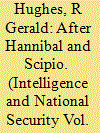

|
|
|
|
|
| Summary/Abstract |
‘I sincerely hope that they (relations between India and Pakistan) will be friendly and cordial. We have a great deal to do, both states, and I think that we can be of use to each other (and to) the world.’ Muhammad Ali Jinnah (1876–1948).1 ‘Intelligence links between neighbours are obviously desirable. It is better to institutionalise them now, rather than trying to activate them in times of crisis (that is why they failed in [the terrorist attacks of] 26/11).2 In due course, both sides would understand the need for ‘open’ intelligence posts in diplomatic missions. In the meantime, petty harassment of each other’s officers and staff could end. Intelligence links can succeed where all others fail. What agencies can achieve is not at times even conceivable in political or diplomatic channels.’ A.S. Dulat and Asad Durrani.3
|
|
|
|
|
|
|
|
|
|
|
|
|
|
|
|
| 2 |
ID:
169006
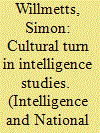

|
|
|
|
|
| Summary/Abstract |
This article explores an emerging “cultural turn” in intelligence studies, which, if fully realized, could entail the expansion of the discipline to include new methodologies and theories, and a more integrative understanding of historical causality that locates intelligence agencies within the widersocio-cultural domain they inhabit. It has two parts. The firstexpands upon what I mean by a new ‘integrative’ understanding of historical causality. The second explores three areas of interest for intelligence scholars where the “cultural turn” has clear and important implications: the study of secrecy, publicity, and “mentalities”.
|
|
|
|
|
|
|
|
|
|
|
|
|
|
|
|
| 3 |
ID:
169007
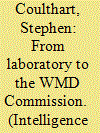

|
|
|
|
|
| Summary/Abstract |
Academic research can improve national security, yet the process by which findings flow from the ivory tower to intelligence agencies is not well understood by scholars. This article addresses this gap through an exploratory case study of when research impacted intelligence: the incorporation of cognitive biases research in intelligence analysis. The results of this study illustrate the importance of idea entrepreneurs—individuals who promote academic research—as well as the need for making academic findings applicable to intelligence practitioners. These results, while based on a single case, suggest new avenues for scholarship exploring knowledge utilization in intelligence.
|
|
|
|
|
|
|
|
|
|
|
|
|
|
|
|
| 4 |
ID:
169008


|
|
|
|
|
| Summary/Abstract |
The role of intelligence in determining outcomes of battles and wars has varied dramatically across conflicts and time, contributing to wide differences in judgments about the importance of intelligence in war. Some analysts minimize the importance of intelligence while others argue it is essential. Opposing perspectives often do not engage each other’s points and generalize from small samples of conflicts. The result is a disjointed discussion of the roles and importance of intelligence in armed conflicts. This article’s aim is to partially rectify this situation by deriving an analytic framework that links intelligence to military operations and strategic outcomes.
|
|
|
|
|
|
|
|
|
|
|
|
|
|
|
|
| 5 |
ID:
169009
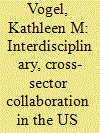

|
|
|
|
|
| Summary/Abstract |
How does one design and sustain interdisciplinary, cross-sector collaboration to improve intelligence results for twenty-first century security threats? This paper will analyse five past and present initiatives designed to create interdisciplinary, cross-sectoral collaboration within different agencies of the US Intelligence Community (IC). We will discuss key features of each effort, their successes and challenges, identify common themes and, propose which collaborative model might be most advantageous for a particular type of project based on project constraints. In so doing, we provide direction for IC leaders seeking to improve academia–industry–intelligence partnerships for future planning on intelligence-funded collaborations.
|
|
|
|
|
|
|
|
|
|
|
|
|
|
|
|
| 6 |
ID:
169005
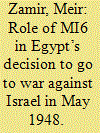

|
|
|
|
|
| Summary/Abstract |
David Ben-Gurion, the founder of the State of Israel, repeatedly accused Britain of provoking the Arab states to invade Israel the day after its establishment in May 1948. To date, historians have not found proof of his accusations in British archives. However, evidence may be found in French archives, especially in Syrian and secret British documents obtained by the French secret services, originating from agents who had infiltrated the Syrian government in Damascus and the British Legation in Beirut. This article, based on French, Syrian, Israeli and British sources, argues that under the Labour government, Arabist MI6 officers in the Middle East, in collaboration with the British High Command in Cairo, pursued an alternative policy to that of the Foreign Office. They provoked Egypt’s King Faruq to go to war against Israel without the knowledge or approval of either Prime Minister Clement Attlee or Foreign Secretary Ernest Bevin, frequently misinforming and misleading them. This watershed research provides details of the goals and modus operandi of those involved in that clandestine plot.
|
|
|
|
|
|
|
|
|
|
|
|
|
|
|
|
| 7 |
ID:
169010


|
|
|
|
|
| Summary/Abstract |
In a true experiment conforming to the criteria of a randomized controlled trial (RCT), we found that intelligence analysts assign significantly more credibility to secret intelligence than to identical open-source intelligence. However, this was true only when the intelligence estimate constituted a ‘complex’ problem characterized by a high degree of uncertainty and not when the estimate constituted a ‘simple’ problem characterized by a low degree of uncertainty. Moreover, we found that intelligence analysts are significantly more confident in their own assessments when they process secret intelligence and more uncertain when they process identical open-source intelligence.
|
|
|
|
|
|
|
|
|
|
|
|
|
|
|
|
| 8 |
ID:
169011


|
|
|
|
|
| Summary/Abstract |
One of the most controversial uses of intelligence by the United States is covert action – secret efforts to change the course of history by intervening secretly into the affairs of other nations or factions. In 1975, the Church Committee held hearings on this subject – a rarity – and four expert witnesses laid out for the panel their recommendations for changes in the conduct of covert action. This dip into the intelligence archives by Intelligence and National Security reveals that much has changed in the world of covert action since 1975, with some of the witness recommendations coming to fruition and others widely ignored.
|
|
|
|
|
|
|
|
|
|
|
|
|
|
|
|
|
|
|
|
|